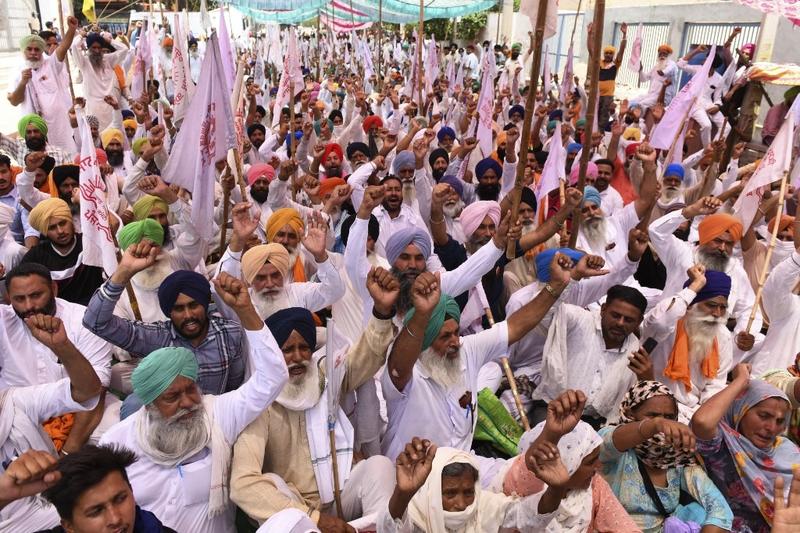 Farmers shout slogans before burning the copies of recent agricultural reforms bill during a demonstration against the central government outside the Bharatiya Janata Party (BJP) office in Amritsar on June 5, 2021. (NARINDER NANU / AFP)
Farmers shout slogans before burning the copies of recent agricultural reforms bill during a demonstration against the central government outside the Bharatiya Janata Party (BJP) office in Amritsar on June 5, 2021. (NARINDER NANU / AFP)
Undeterred by New Delhi’s refusal to pull contentious agricultural laws despite six months of protests, thousands of farmers in India have vowed to continue their agitation and prepare for a longer battle, braving the scorching heat and the COVID-19 pandemic.
Authorities had been hoping that the COVID-19 crisis would prompt the farmers to abandon their mass sit-ins and bring their fight to a halt. But such expectations have been dashed
Protesting farmers camped out at various places at the borders of the national capital have seen their ranks swell in the past few days, sending a message to the Indian government that the months-long campaign will not end until their demand is met fully.
The farmers are seeking complete repeal of three new farms laws that were introduced by the Narendra Modi government last year and subsequently passed by the nation’s parliament in September.
Authorities had been hoping that the COVID-19 crisis would prompt the farmers to abandon their mass sit-ins and bring their fight to a halt. But such expectations have been dashed.
Following a decline in new coronavirus cases in the past few weeks, and local governments partially lifting their lockdown measures, farmers have started gathering again in strength at protest sites, drawing up plans to intensify their agitation in coming months.
ALSO READ: Thousands of women join Indian protests against farm laws
India’s Agriculture Minister Narendra Singh Tomar said on June 9 that the government is ready to resume talks with protesting farmers, but asked the unions to point out their objections with sound logic to the provisions of the farm laws.
The government and unions have held eleven rounds of talks so far, the last being on Jan 22, in a bid to break the deadlock. Talks have stalled following widespread violence by protesting farmers in New Delhi on Jan 26, when India marked its Republic Day.
The government says the new laws will open up opportunities for farmers and reform the agriculture sector but the protesters say the laws will benefit big corporations and destroy farmers’ livelihoods.
"All political parties of the country wanted to bring the farm laws, but they could not gather courage to bring them. Prime Minister Narendra Modi’s government took this big step in the interest of farmers and brought reforms," Tomar said at a Cabinet briefing on June 9.
However, Rakesh Tikait, spokesperson of Indian Farmers’ Union, the umbrella organization of over 40 Indian farmers’ unions that is leading the agitation around the national capital, said: “Government will have to withdraw the three farm laws permanently if it wants to end the protest.”
After the tenth round of talks with protesting farmer leaders, the government had in January proposed to suspend the three farm laws for next 18 months, but the farmers demanded complete repeal of the laws.
Farmers’ unions are preparing for a longer battle. They want to spread the protest throughout the country, if the laws are not repealed completely, representatives said.
“Once the monsoon gets over, post-July, groups of peasants led by prominent union leaders will travel across India’s most populous state Uttar Pradesh and later in other states,” said Yudhbir Singh, general secretary, Indian Farmers’ Union.
Singh said there had been a drop in the number of protesters at three sites outside New Delhi over the past three to four months due to the surge in COVID-19 cases in the country and also because of the harvesting season. But farmers have now started to join the protest sites in large numbers again, he said.
The protest is going strong as crowds are coming back following the harvesting season, farmers said.
A group of farmers with over 100 tractors and trucks reached Delhi’s Singhu border with the neighboring Haryana state on June 7 while another group will join shortly, said Sharavan Singh, a farmer leader from Punjab state, adding: “we don’t fear COVID-19 because we have bigger things to worry about.”
Satnam Singh, a protester at Delhi’s Tikri border, between Delhi and Haryana state, agreed, saying: “These farm laws are a bigger threat to us than COVID-19.”
“We will survive the COVID-19 situation but if we do not resist the farm laws brought by the Modi government, our future is doomed,” said Balvir Singh Bidhuri, another protesting farmer at Singhu who hails from Haryana.
Experts have suggested that people should continue to follow COVID-19 norms and avoid mass gatherings for the next one year to avoid a possible third wave of coronavirus infections in India.
On June 11, India reported 91,702 new COVID-19 infections over the past 24 hours, taking the nation’s total case tally to nearly 29.3 million. Meanwhile, there were 3,403 new pandemic-related deaths, taking the total fatality count to more than 363,000.
READ MORE: India farmers block highway outside Delhi to mark 100th day of protest
In the national capital Delhi, there were 305 new cases and 44 deaths.
India’s main opposition party, the Indian National Congress, suggested on June 9 that the only way to end the ongoing farmers' protest is to withdraw the three contentious farm laws.
It urged the government to shed its stubbornness and accede to the farmers’ demand.
“The farmers genuinely do not trust the government. Farmers believe the government's proposal to resume the talks is a trick to end the ongoing protest,” said R Ramakumar, National Bank for Agriculture and Rural Development chair professor and economist at the Tata Institute of Social Sciences.
The writer is a freelance journalist for China Daily.


